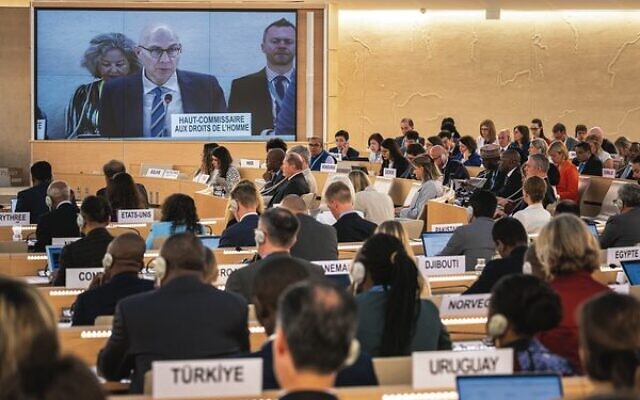US, 27 countries condemn UN probe into Israel
The COI, which is the highest-level investigation that can be ordered by the UNHRC, was set up in May 2021 following a surge in deadly violence between Israelis and Palestinians earlier in the month.

(TIMES OF ISRAEL, AFP) – The United States, on behalf of 27 countries, last week condemned the open-ended nature of the UN investigation into alleged human rights violations in the Israeli-Palestinian conflict.
US ambassador Michele Taylor told the United Nations’ Human Rights Council (UNHRC) the group of countries was “deeply concerned” about the Commission of Inquiry (COI), with its “open-ended mandate with no sunset clause” or closing date.
The countries, including Austria, Britain, Canada and Italy, demanded an end to the “long-standing disproportionate attention given to Israel in the council”.
The COI, which is the highest-level investigation that can be ordered by the UNHRC, was set up in May 2021 following a surge in deadly violence between Israelis and Palestinians earlier in the month.
The UNHRC established an ongoing independent, international COI to investigate “all alleged violations of international humanitarian law and all alleged violations and abuses of international human rights law” in Israel, the West Bank and the Gaza Strip.
It is charged with looking into “all underlying root causes of recurrent tensions, instability and protraction of conflict, including systematic discrimination and repression based on national, ethnic, racial or religious identity”.
The first-ever open-ended COI is chaired by former UN rights chief Navi Pillay of South Africa, with India’s Miloon Kothari and Chris Sidoti of Australia as the other two conducting the probe.
At a press conference in Geneva last Tuesday, Kothari referenced the calls for a sunset clause.
“We would like to see a sunset of the Israeli occupation … but until that time, an open-ended mandate is more than justified,” he said.
Israel is refusing to cooperate with the investigation, citing what it says is longstanding bias against it at the UN.
“Isn’t it a spurious, very silly reason not to talk to the commissioners because they have an open mandate?” Pillay told the press conference.
In their second report published earlier this month, the investigators found that authorities both in Israel and the Palestinian territories were violating Palestinian civil society rights through harassment, threats, arrests, interrogations, detention and torture.
Israel’s authorities were responsible for the majority of the violations, the report said.
“Our report found that Israeli authorities have used a variety of punitive methods intended to deter and interfere with the activities of Palestinian civil society members,” Pillay told the UNHRC on Tuesday, via video link.
Last year, Kothari was condemned after comments that the “Jewish lobby” was controlling social media and questioning why Israel was allowed to be a member of the UN.
Pillay has in the past been accused of displaying “demonstrable bias” against Israel, while Sidoti remarked last year that “accusations of antisemitism are thrown around like rice at a wedding”.
While Australia was not among the 27 nations joining the chorus of condemnation last week, in the UNHRC last June Australia’s UN ambassador Amanda Gorely said the council “brings a disproportionate scrutiny to Israel”.
“Australia’s guiding principle will be advancing the cause for peace. Viewing any conflict from one perspective will not achieve that goal,” she said.

comments